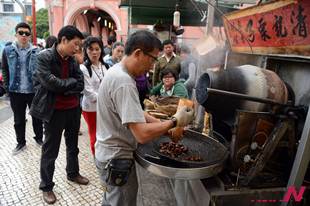Korea-bashing in China sparks soul-searching
Bloggers here blamed some Koreans for their alleged double standards on foreigners, arguing their immaturity could trigger anti-Korean sentiment in China.
“Koreans tend to be nice to Americans or Europeans and try to help them when they are in trouble here. But those who are from Asia, Africa or China are often getting the cold shoulder here from Koreans,” a blogger named Kim Jong-shik said in a message posted in the chatting platform run by the Ministry of Foreign Affairs and Trade.
To make legitimate his statement Kim quoted an EBS program that had aired the different reactions by Koreans to undercover reporters (Africans, Americans and Europeans) when these nationals asked how to get to their destination.
Another blogger pointed out that a fundamental change needs to be made in some Koreans’ deep-seated distrust of China and made-in-China products, arguing it is the root cause of the anti-Korean sentiment in China.
“Some people here tend to underestimate products made by Chinese companies…. (and) some even harbor hatred toward the Chinese by characterizing their country of origin as a dangerous one,” Moon Kyung-rang said.
Another blogger, however, pointed his finger at China’s state-controlled media as being responsible for fanning the anti-Korean sentiment.
Some bloggers revealed skepticism about the anti-Korean sentiment abating in the near future, saying it will require a fundamental conversion in Koreans’ perception toward China and the Chinese.
The foreign ministry has opened the chatting site from July 3 to allow free expression of opinions of the causes of the anti-Korean sentiment in China and possible solutions. The feedback will be considered when drawing up future foreign policy. The site will be open until July 31.
According to a survey of 1,220 Chinese exchange students in Korea, nearly 40 percent of them answered they feel some kind of anti-Korean sentiment. The respondents said Chinese are discriminated against here and that Koreans are friendlier to Americans or the Japanese than the Chinese. Some Chinese said Koreans displayed a biased view about China and believed China is a poor country, adding this made them feel bad about Koreans.
Nearly 60,000 young Chinese students are enrolled in schools in Korea.
China is South Korea’s number one trading partner. The two economies are seeking closer cooperation in a free trade agreement for which negotiations are underway.
Despite the strategic significance, the Sino-Korea relations have often been put to the test over the past few years as some touchy issues, including anti-Korean sentiment and Chinese fishermen illegal fishing in the West Sea, remain unsettled.
Anti-Korean sentiment in China made newspaper headlines back in April 2008 when the Beijing Olympic torch was relayed from South to North Korea.
On April 28, nearly 6,500 Chinese, both Chinese students studying in Korea and those who flew to Seoul from China, gathered in downtown Seoul when the torch relay was scheduled. They clashed with Korean human rights activists who shouted “No human rights, no Olympics,” leading to some Koreans and Chinese getting injured as a result. <The Korea Times/Kang Hyun-kyung>




